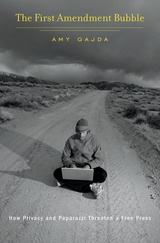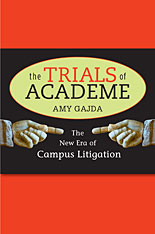
In determining the news that’s fit to print, U.S. courts have traditionally declined to second-guess professional journalists. But in an age when news, entertainment, and new media outlets are constantly pushing the envelope of acceptable content, the consensus over press freedoms is eroding. The First Amendment Bubble examines how unbridled media are endangering the constitutional privileges journalists gained in the past century.
For decades, judges have generally affirmed that individual privacy takes a back seat to the public’s right to know. But the growth of the Internet and the resulting market pressures on traditional journalism have made it ever harder to distinguish public from private, news from titillation, journalists from provocateurs. Is a television program that outs criminals or a website that posts salacious videos entitled to First Amendment protections based on newsworthiness? U.S. courts are increasingly inclined to answer no, demonstrating new resolve in protecting individuals from invasive media scrutiny and enforcing their own sense of the proper boundaries of news.
This judicial backlash now extends beyond ethically dubious purveyors of infotainment, to mainstream journalists, who are seeing their ability to investigate crime and corruption curtailed. Yet many—heedless of judicial demands for accountability—continue to push for ever broader constitutional privileges. In so doing, Amy Gajda warns, they may be creating a First Amendment bubble that will rupture in the courts, with disastrous consequences for conventional news.

Once upon a time, virtually no one in the academy thought to sue over campus disputes, and, if they dared, judges bounced the case on grounds that it was no business of the courts. Tenure decisions, grading curves, course content, and committee assignments were the stuff of faculty meetings, not lawsuits.
Not so today. As Amy Gajda shows in this witty yet troubling book, litigation is now common on campus, and perhaps even more commonly feared. Professors sue each other for defamation based on assertions in research articles or tenure review letters; students sue professors for breach of contract when an F prevents them from graduating; professors threaten to sue students for unfairly criticizing their teaching.
Gajda’s lively account introduces the new duo driving the changes: the litigious academic who sees academic prerogative as a matter of legal entitlement and the skeptical judge who is increasingly willing to set aside decades of academic deference to pronounce campus rights and responsibilities.
This turn to the courts is changing campus life, eroding traditional notions of academic autonomy and confidentiality, and encouraging courts to micromanage course content, admissions standards, exam policies, graduation requirements, and peer review.
This book explores the origins and causes of the litigation trend, its implications for academic freedom, and what lawyers, judges, and academics themselves can do to limit the potential damage.
READERS
Browse our collection.
PUBLISHERS
See BiblioVault's publisher services.
STUDENT SERVICES
Files for college accessibility offices.
UChicago Accessibility Resources
home | accessibility | search | about | contact us
BiblioVault ® 2001 - 2024
The University of Chicago Press









